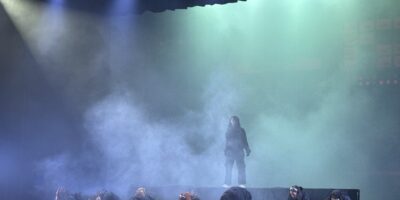Antiheroes
The theme of the 86th Academy Awards was the hero, celebrated by montages of heroic characters doing heroic things of the animated, “everyday,” and “really heroic” nature and dragging out the ceremony by a good 15 minutes.
Here are five movies about heroes who do unheroic things, ordered from anti-heroes who do their own laundry, to heroes in name only.
Spider-Man 2 (2004)
Spider-Man was one of the first comic book anti-heroes: not because he was particularly dark, or tragic, or snarky, but because he had problems. Here, Spider-Man/Peter Parker (Tobey Maguire) can hardly hold down a job. His rent is often paid late. His girlfriend Mary Jane (Kristen Dunst) leaves him. Consequently, Peter Parker has an emotional breakdown due to the stress and retires as Spider-Man. This causes the crime rate in New York to spike, and Dr. Octavius (Alfred Molina) to emerge from the shadows. The poor boy just can’t win.
Spider-Man 2 is the best of the Tobey Maguire Spider-Man trilogy: Spider-Man (2002) had too sprightly a spring in his step for a guy whose uncle just died, which makes sense since it only gives lip service to his origin. Spider-Man 3 (2007) had way too many characters, one of whom was the dreaded Emo Peter. Spider-Man 2 strikes a balance between Peter Parker’s emotional and physical struggles. The action scenes are as dynamic and flexible as Doc Ock’s mechanical tentacles. The dialogues are neither weighty exposition (X-Men), ominous warnings (Nolan’s Batman) or improbably snarky-yet-meaningful quips (Marvel, and The Amazing Spider-Man). They are quietly orchestrated dialogues between humble human beings about relatable problems. Spider-Man 2 is as human as superhero movies get.
Despicable Me (2010)
Gru (Steve Carell) is a capital-V Villain, who would like to pull off the ballsiest act of villainy ever. As part of his plan to steal the moon, he adopts three girls so that they can easily infiltrate a rival’s (Jason Segel) base in the guise of Girl Scouts. Of course, Gru finds himself caught between his duties as a father and his desire for fame.
To begin, Gru isn’t even a hero. He’s a professional villain. His number-one goal in life is to enter history as the Greatest Villain of All Time (his second was to become an astronaut). Raping, murdering, and pillaging come secondary to the shock and awe of a good spectacle. He is an entertaining protagonist.
He is unfortunately upstaged by his own minions: yellow watermelon-shaped creatures whose principle roles are to cheer for Gru and babysit the girls. They are like Jack Sparrow in the Pirates of the Caribbean, and the Penguins in Madagascar. Their role grows larger and larger in the sequels until they get their own movie altogether. I wish it weren’t so – the minions, although cute and perfectly suited for slapstick comedy, outshine the main plot. You can definitely have too much of a good thing.
Quantum of Solace (2008)
After the death of his lover in Casino Royale (2006), James Bond (Daniel Craig) is somewhat soured to the world and everyone in it. He thus proceeds to star in the most violent Bond film ever, in which he kicks a total of 250 asses in the pursuit of environmentalist Dominic Greene (Mathieu Amalric), who wants to monopolize the water supply of Bolivia.
Daniel Craig, is of course, a dangerous Bond to start with. He is a tiger where his predecessors were Persians. This does not mean, however, that his strengths were best showcased in Quantum of Solace. The 250 asses he kicked would have been more entertainingly disposed of through guile and intimidating small talk. But it seems that Mr. Bond doesn’t have time for that shit anymore, seeing as how it got his girl killed in the prequel. That’s too bad. I like Daniel Craig best when he wears a nice suit, speaks dismissively of the weather, and smiles with just a hint of bared teeth.
The Boondock Saints (1999)
The hooligan MacManus twins (Sean Patrick Flanery and Norman Reedus) kill two members of the Russian Mafia and receive what they perceive to be a “calling” from God, asking them to cleanse Boston of crime. They are unwatchably ill-suited to this task.
Anti-heroes are supposed to be flawed, but not to the extent of being unsympathetic. The titular Saints are uncouth. Their plans are poorly wrought. I guess their execution speeches are cool, but that’s the only thing I enjoyed about this movie. I think this is director Troy Duffy’s attempt at Tarantino, but it is entirely lacking in self-awareness, affection for its source material (gangster movies?) and empathy. Sure, Tarantino has featured violent louts in his movies before (Pulp Fiction, Inglourious Basterds) but they had purpose and a modicum of charm. Duffy’s stars lack both.
The Chronicles of Riddick (2004)
Riddick (Vin Diesel) is a dangerous convict with a scowl on his face and a chip on his shoulder. He is definitely violent and probably evil, but that’s not why he’s pursued by the Necromongers, an imperialistic race that lives by the maxim “you keep what you kill.” They hunt each other across hostile planets and space ships to alternately bring about and prevent fulfillment of a prophecy, but to what end?
Well, there’s a lot of fighting between morally dubious characters. I cheered for Riddick because he’s more of a badass, and that his quest for revenge is more sympathetic than the Necromonger’s fulfillment of Manifest Destiny. It’s a lot like deciding whom to vote for in the American two-party system, I guess.




Leave a Reply